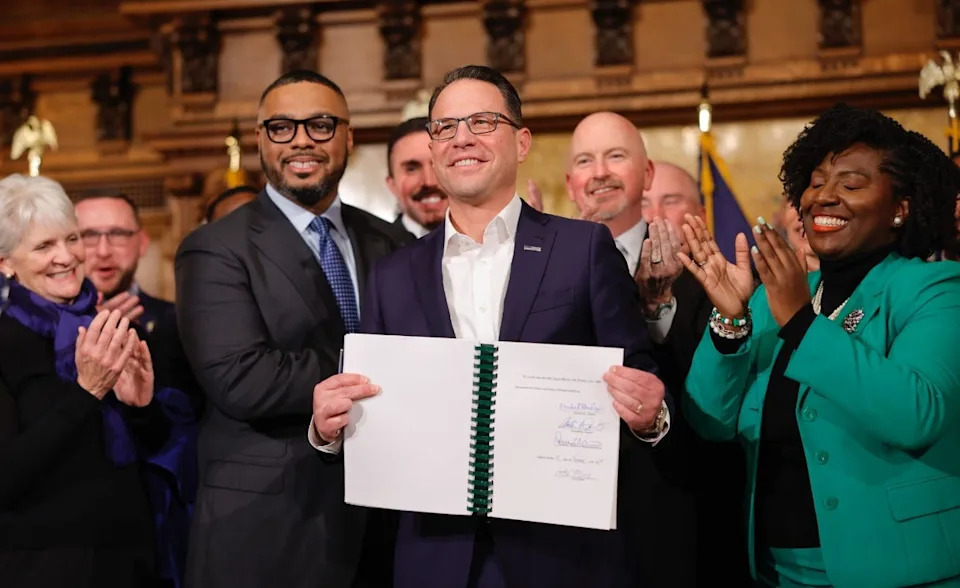Education
Pennsylvania Budget Boosts Oversight of Cyber Charters, Teacher Support

Pennsylvania’s 2025-26 budget introduces significant changes to K-12 school funding and policy, particularly aimed at enhancing oversight of cyber charter schools. The budget allocates approximately $50.1 billion and includes measures to address the state’s ongoing teacher shortage while increasing funding through the state’s adequacy formula.
The budget’s provisions primarily focus on cyber charter schools, which have faced scrutiny from both political parties. According to a report by Pennsylvania’s GOP state Auditor General Tim DeFoor, five cyber charter schools were found to be generating substantial revenue while spending it in ways that did not correlate with educational outcomes. As a result, public schools will now be able to deduct more from the tuition they pay for students attending these online institutions. The legislature estimates this change could save public school districts around $178 million statewide.
Governor Josh Shapiro and Democratic lawmakers have expressed support for reforms, including a proposal to cap cyber charter tuition at $8,000 per student. Susan Spicka, executive director of Education Voters PA, welcomed the changes, stating, “It’s a step in the right direction, and it is a very welcome step.”
New Accountability Measures for Cyber Charters
The budget also implements new policies designed to increase accountability for cyber charter schools. One notable change restricts public school students with high truancy rates from transferring to cyber charters, unless sanctioned by a judge. Additionally, students will be required to appear on webcam during live instruction to be marked as present, while cyber charters must conduct weekly wellness checks on students.
These measures follow a tragic incident involving a cyber charter student who died due to severe abuse at home, which had gone unreported by teachers. This led to a wrongful death lawsuit against the school, highlighting the need for increased oversight.
Another significant policy change allows public school districts to more easily dispute tuition payments for students who have moved away during the school year. Peter Schweyer, House Education Chair, emphasized that these reforms aim to ensure students receive quality education and that taxpayers get value for their contributions.
Funding Adjustments and Teacher Support Initiatives
The budget also revises the adequacy formula, originally created in 2024 to address inequities in school funding. Although the formula remains largely unchanged, an additional $500 million will be distributed, part of a planned increase aimed at reaching $4.5 billion over nine years. Notably, every school district will receive a minimum of $50,000, benefiting more than 130 districts that would have otherwise received no funding.
Advocates, including the Education Law Center and the Public Interest Law Center, praised the budget as a positive step toward a fairer public education system, emphasizing the need for continued commitment to funding.
With the state facing a teacher shortage, the budget includes provisions to help recruit and retain teachers. New policies facilitate entry into the profession for individuals from nontraditional backgrounds. For instance, the budget increases funding for student teacher stipends, allowing student teachers to receive compensation while working towards certification.
Moreover, districts will now have the option to hire teachers with lapsed certifications while they work to re-certify. The introduction of an experience-based teaching certificate aims to fast-track the certification process for professionals transitioning into teaching roles.
Other noteworthy initiatives include mandatory evidence-based literacy education for early-grade teachers and annual reporting on student progress to the Department of Education. The budget also allocates $125 million for school repairs and $100 million for school safety and mental health grants.
Overall, Schweyer described the budget as a comprehensive solution, stating, “There’s more to do, there always is, but overall we’re pleased with where we landed.” This budget marks a pivotal moment for Pennsylvania’s education system as it strives to enhance accountability, increase funding, and address the pressing issue of teacher shortages.
-

 Science2 months ago
Science2 months agoNostradamus’ 2026 Predictions: Star Death and Dark Events Loom
-

 Technology3 months ago
Technology3 months agoOpenAI to Implement Age Verification for ChatGPT by December 2025
-

 Science2 months ago
Science2 months agoBreakthroughs and Challenges Await Science in 2026
-

 Technology8 months ago
Technology8 months agoDiscover the Top 10 Calorie Counting Apps of 2025
-

 Technology6 months ago
Technology6 months agoElectric Moto Influencer Surronster Arrested in Tijuana
-

 Health6 months ago
Health6 months agoBella Hadid Shares Health Update After Treatment for Lyme Disease
-

 Health6 months ago
Health6 months agoAnalysts Project Stronger Growth for Apple’s iPhone 17 Lineup
-

 Technology2 months ago
Technology2 months agoTop 10 Penny Stocks to Watch in 2026 for Strong Returns
-

 Health6 months ago
Health6 months agoJapanese Study Finds Rose Oil Can Increase Brain Gray Matter
-

 Science5 months ago
Science5 months agoStarship V3 Set for 2026 Launch After Successful Final Test of Version 2
-

 Education6 months ago
Education6 months agoHarvard Secures Court Victory Over Federal Funding Cuts
-

 Health6 months ago
Health6 months agoErin Bates Shares Recovery Update Following Sepsis Complications





















